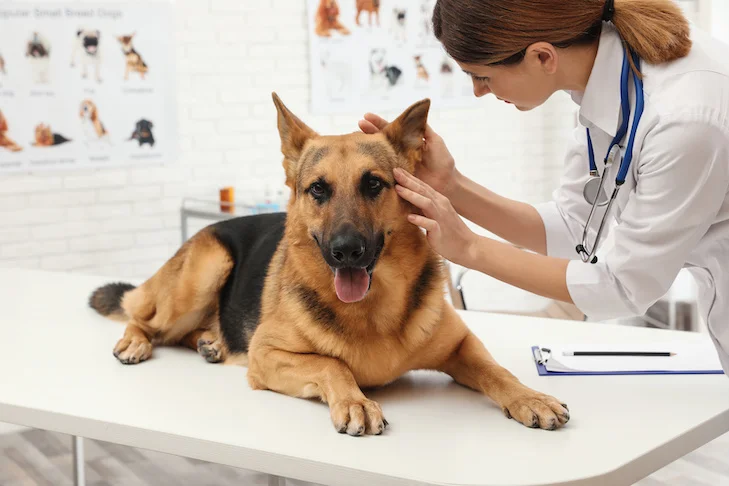Indigestion in Dogs is one of the hardest experiences for any pet owner especially when their puppy is clearly distressed or uncomfortable.
Table of Contents
There is a problem with something being obvious, but your dog may not be able to communicate exactly what they think.
Instead, you should pay attention to changes in their actions and behaviors in order to put the evidence together and figure out what is wrong — in most cases.
Also Read: Can Bernedoodle get along with German Shepherds? All You need to know
When it comes to dog indigestion or gastric problems, the unpleasant symptoms are often very obvious.

Although all dog breeds are prone to stomach problems from time to time, you should look for indications that indicate a more serious gastric problem.
Below, we cover everything you need to know as a pet owner about indigestion in dogs.
What is Indigestion in Dogs
Because your dog’s diet is relatively unrealistic, it’s easy to forget that they can suffer from gastric ulcers just like humans.
Many people mistakenly think that dogs have a very strict and strong digestive system.
This is understandable, especially when you remember that the canine has not yet been removed from its wolf ancestors.
Among other factors, breeding and selective genetic breeding years gradually soften the average dog’s stomach.
After all, your normal dog’s indigestion is just gastric distress, which can be caused by eating the wrong food, too much food or too much of a certain type of food.
Often it causes stomach problems:
- Nausea
- Heartburn
- Acid reflux
Causes Of Indigestion In Dogs
Indigestion in dogs can be attributed to a variety of causes, each contributing to the discomfort and digestive disturbances that our furry companions might experience. One common culprit behind canine indigestion is acid reflux.
Dogs may suffer from acid reflux due to a range of factors, including allergies or food intolerances, intestinal dysbiosis, poor digestion, bowel disorders, and low stomach acid (known as hypochlorhydria). These issues disrupt the delicate balance of the digestive system and can result in symptoms of indigestion.
Chronic vomiting can exacerbate indigestion problems in dogs. Persistent vomiting can be caused by underlying diseases or medications, leading to the regurgitation of stomach acids. This recurrent exposure to stomach acid can irritate the esophagus, further contributing to the discomfort experienced by the dog.
Additionally, hiatal hernias or diaphragmatic hernias can be another source of indigestion in dogs. Hiatal hernias occur when there is an abnormal opening in the diaphragm, allowing portions of the stomach, liver, or intestines to move into the chest cavity.
This unusual positioning of the stomach can disrupt the normal digestive process and trigger acid reflux. This condition often requires medical attention and, in some cases, surgery to correct.
Real-life examples of these causes of indigestion in dogs can be found in various situations. For instance, a dog with food allergies might experience frequent bouts of indigestion, characterized by vomiting, diarrhea, and discomfort after eating certain foods.
In contrast, a canine with a hiatal hernia could show signs of indigestion such as regurgitation and difficulty swallowing, especially after meals. Understanding these causes of indigestion in dogs is essential for pet owners to provide proper care and seek timely veterinary assistance when needed, ensuring their pets enjoy a healthy and comfortable life.
In general, standard dog indigestion comes down to three important gastric problems:
Excess Stomach Acid Structure – When the body is functioning properly, this powerful substance helps human and dog stomachs to break down food into nutrients and waste and aid the digestive process.
However, indigestion occurs when your puppy’s stomach begins to produce more stomach acid.
In such cases, the pressure in the gastric system increases, which causes pain, discomfort and bloating.
In response, the dog’s body naturally tries to alleviate the problem by releasing as much stress as possible;
And the only way stress can go through your puppy’s orbits, i.e. mouth and anus.
- Inflammation of the stomach – this causes muscle contraction, which leads to vomiting.
- Inflammation of the intestine – Similarly, it causes muscle contraction in the intestines, which accelerates the contents of your stomach through the tract, leaving very little time for fluids to be properly absorbed into the intestines. This causes diarrhea.
Signs and symptoms of dog indigestion
As you might have guessed, stomach problems are a common problem that every dog owner runs into.
There are many causes of vomiting and diarrhea in dogs: Whole textbooks have been written on the subject.
The most common cause is simple: scavenging. Dogs evolved into “eat first and then ask questions”.
When a dog eats what it really needs to be alone (the list of possibilities is too long to categorize), their digestive system becomes inflamed (red and irritated) as a consequence.
Many notable dog indigestion symptoms come with daily gastric problems. In addition to:
Weight Loss – When your dog’s stomach is damaged, especially if the problem persists, it can have an impact on their diet.
First, your dog may have trouble eating himself, breathing regularly or ocking regularly.
If this thing continues, it may stop eating or you may lose interest in food altogether. Over time, this can lead to noticeable weight loss.
Lip-smacking and gulping – Frequent lip smack and gulping are noticeable signs that your dog may soon vomit. Every pet helper:
Saliva production is initiated by the salivary glands and increased saliva may be due to two different scenarios:
more saliva is being produced or saliva has reduced clearance. In case of nausea, there is excessive production of saliva.
Because vomiting is highly acidic in nature, it can cause damage to the dog’s throat, mouth and teeth.
The increase in saliva, therefore, helps to reduce this harmful effect.
Flatulence – If you notice that your puppy’s stomach is visibly distended, by gas buildup, it’s a sign that something is wrong.
It may not always be obvious, but you can check your dog’s stomach and local areas by feeling sensitive. If they respond with pain, you know there is a gastric problem.
Also, frequent crying is a clear sign that they are in distress.
Vomiting / Diarrhea – A very obvious and unpleasant sign that your dog has a stomach ache as the body tries to get rid of violently unpleasant substances.
Bad Breath – Vomiting, bile choking and high stomach acid can make your dog’s breath less than pleasant. Although it is not usually like roses, the smell is particularly intense and acidic.
Behavior change – If your puppy is generally energetic but begins to act differently, especially if their behavior is characterized by lethargy, they may be dealing with discomfort and low energy levels due to impairment caused by improper digestion.
Eating grass – A common phenomenon is that when a dog’s stomach is upset, they eat grass in natural emetic or osmotic form. In 2014, a study on naturally self-eating pests was released from the Proceedings of the National Academy of Sciences.

It says: “If a dog eats grass on a walk may seem to be self-medication. The dog probably has a stomach or a parasite. The grass helps them to eliminate the problem of vomiting or feces. ”
Releasing of gas – Fart is a common doggie pastime, and some species are much more gassier than others. An excess fart indicates that your dog is trying to get relief from stomach stress.
What can you do about indigestion in dogs?
If you have a dog with a stomach ache, there are several home remedies you can try to treat dog indigestion. In addition to:
- Wait – indigestion may be the only thing that often causes your dog to eat badly. Sometimes, the best answer is to let nature do its work and see if they can overcome the problem itself. In such cases, do not feed your pet for 12 to 24 hours so that you do not aggravate the problem.
- Snow – Even if your dog is tempted to give them too much water after throwing up or having diarrhea, do not do so. Hydration is important, but your dog is likely to drink more water and make things worse. Instead, give them a bowl of ice chips to chew once every few hours. If the puppy can lower them, you can go to the water.
- Canned Pumpkin – For every pet dry, canned pumpkin is one of the best complete remedies for pet indigestion. They write:
- It has a low glycemic index, so it is absorbed slowly, which helps the stomach and digestion. Since you do not want to feed your dog spices, get a canned pumpkin, and do not mix over the pumpkin. Small dogs (about five pounds) can be given ½ teaspoon canned pumpkin, large dogs (about 75 pounds) can be given 1 tbsp.
- Diet change – If digestive problems are the result of gastric acid formation, you may want to change your dog’s diet. Diet improvement is usually an effective way to improve digestion in a dog’s body. Stop eating for a day or two, and then give them a low-fat, low-protein small and regular meal because fats and proteins often cause gastric acid to rise.
- Bone Broth – One of the best ways to soothe the stomach and hydrate your puppy is to give them bone broth soup. It can take up to 24 hours to make, but once you are done with it, you can freeze it and break it down when stomach problems come up. For the recipe, see Brindleberry Acres provided.
Treat your dog’s indigestion
Although all of these are signs of daily indigestion in dogs, they can also indicate more serious medical conditions.
Whether or not your dog’s digestive problems are getting worse or worse, he or she is suffering more than normal digestive problems.

Digestive upset is common for dogs and cats, but when your dog’s health begins to decline, you may need to see a vet for further testing.
Treating indigestion in dogs requires a thoughtful and thorough approach to alleviate their discomfort and ensure their well-being. When you suspect your canine companion is suffering from indigestion, the first step is to seek professional veterinary care.
A visit to your veterinarian is essential, as acid reflux, a common cause of indigestion, cannot be visually diagnosed from the outside. During this consultation, your vet will conduct a comprehensive physical examination and gather information about your dog’s history and symptoms, which will serve as valuable clues in the diagnostic process.
It’s crucial for your veterinarian to rule out other conditions that can mimic acid reflux in dogs. These may include toxin ingestion, abscesses, tumors, megaesophagus, and mouth or throat cancer. To aid in diagnosis, an X-ray can sometimes reveal the presence of a hiatal hernia if it’s sufficiently large, although smaller hernias may not be visible through radiographs.
In cases where acid reflux is suspected but not conclusively diagnosed, your veterinarian might recommend an endoscopy. This procedure involves administering anesthesia to your dog and inserting a small camera down their throat and into the esophagus, allowing the vet to inspect for any esophageal damage or other issues.
Once a diagnosis is confirmed, treatment options can be tailored to your dog’s specific condition. If your dog has a hiatal hernia, surgical intervention may be necessary to correct the defect. Dietary adjustments often play a key role in managing acid reflux in dogs.
Typically, your veterinarian may recommend withholding food for a day or two before transitioning your dog to a special diet. This diet is designed to be low in fat and protein, with the aim of minimizing stress on the digestive tract. Feeding your dog smaller, more frequent meals throughout the day can also help alleviate symptoms, as they are easier on the digestive system.
Fat should be avoided, as it can weaken the sphincter separating the esophagus from the stomach, while protein can increase stomach acid production.
Additionally, providing your dog with a supplement containing a blend of prebiotics, probiotics, and enzymes can be an effective natural approach to reduce acid reflux. One such product, digestive enzymes for dogs, contains ingredients like psyllium husk, calcium carbonate, ground golden flax, prebiotics, and probiotics. This combination of digestive aids can help support your dog’s digestive system and promote overall digestive health, contributing to a happier and healthier life for your furry friend.
To provide a clearer overview of the various treatment options for dog indigestion, here’s a chart summarizing these approaches:
| Treatment Options for Dog Indigestion |
|---|
| 1. Veterinary Consultation |
| – Physical examination and history assessment |
| – Rule out conditions mimicking acid reflux |
| 2. Diagnostic Procedures |
| – X-ray (for detecting large hiatal hernias) |
| – Endoscopy (visual inspection of the esophagus) |
| 3. Surgical Intervention (for hiatal hernia) |
| – Correct the hernia through surgery |
| 4. Dietary Adjustments |
| – Transition to a low-fat, low-protein diet |
| – Smaller, more frequent meals |
| 5. Digestive Supplements |
| – Prebiotics, probiotics, and enzymes supplement |
| – Supports overall digestive health naturally |
By combining proper veterinary care with these treatment options, you can help your beloved canine companion find relief from indigestion and enjoy a happier, healthier life.
How long does dog indigestion last?
The duration of dog indigestion can vary widely depending on the underlying cause, the severity of the condition, and the treatment provided. In general, mild cases of indigestion in dogs may resolve within a day or two with proper care, while more serious cases or those caused by chronic conditions may require ongoing management.
Causes of dog indigestion can include:
- Dietary Factors: Sudden changes in diet, consumption of spoiled or inappropriate food, or food allergies can lead to temporary indigestion. These cases are often short-lived and can resolve within a day or so once the offending substance is removed from the dog’s diet.
- Acute Illness: Sometimes, indigestion can be a symptom of an acute illness or infection. In such cases, the indigestion may persist until the underlying illness is treated and resolved.
- Chronic Conditions: Chronic conditions like gastroesophageal reflux disease (GERD), inflammatory bowel disease (IBD), or certain pancreatic disorders can lead to recurrent or long-term indigestion. These cases typically require ongoing management, and the duration of indigestion can vary.
- Hiatal Hernia: If indigestion is caused by a hiatal hernia, surgical correction may be necessary, and the recovery period can vary depending on the surgery’s success.
Symptoms of dog indigestion may include vomiting, diarrhea, abdominal discomfort, excessive gas, belching, regurgitation, and changes in appetite or behavior. It’s essential to recognize these signs and seek veterinary care promptly.
The key takeaway is that the duration of dog indigestion varies widely and depends on the specific cause. Early detection and prompt veterinary care can help shorten the duration of indigestion and improve your dog’s comfort and overall health. It’s essential to work closely with your veterinarian to determine the underlying cause and develop a tailored treatment plan for your furry friend.
Homemade Remedy For Upset Stomach in Dogs
Step 1: Gather Your Ingredients Before you start preparing the ginger remedy, ensure you have the following ingredients and supplies on hand:
- Fresh ginger root
- A sharp knife
- A cutting board
- A small saucepan
- Water
- A fine-mesh strainer
- A bowl or cup for administering the remedy
- A spoon or syringe for feeding
Step 2: Choose Fresh Ginger Opt for fresh ginger root, as it contains the active compounds that are most effective in soothing your dog’s upset stomach. Avoid using powdered ginger or ginger supplements, as they may not be as potent.
Step 3: Prepare the Ginger Peel and slice a small piece of fresh ginger root, approximately half an inch to one inch in size. This should be enough for a single dose. Ginger is potent, so a little goes a long way.
Step 4: Boil the Ginger In a small saucepan, add one cup of water and the sliced ginger. Bring the water to a gentle boil, then reduce the heat and simmer for about 10-15 minutes. This process allows the ginger to release its beneficial compounds into the water.
Step 5: Let It Cool Remove the saucepan from heat and allow the ginger-infused water to cool to room temperature. Ensure it’s not too hot to avoid burning your dog’s mouth or throat.
Step 6: Strain the Liquid Using a fine-mesh strainer, carefully strain the ginger-infused water into a clean bowl or cup. This will remove the ginger solids, leaving you with the ginger-flavored liquid.
Step 7: Administer the Ginger Remedy You can administer the ginger remedy to your dog in one of the following ways:
- Directly into the Mouth: If your dog is cooperative, you can use a spoon or a syringe (without a needle) to gently place the ginger-infused water at the back of your dog’s mouth. Slowly dispense the liquid to ensure your dog swallows it.
- Mix with Food: If your dog is not a fan of taking liquids directly, you can mix the ginger-infused water with a small amount of your dog’s regular food. Ensure they consume the entire mixture.
Step 8: Dosage The appropriate dosage of ginger-infused water for dogs varies depending on their size. As a general guideline:
- Small dogs (under 15 pounds): 1-2 teaspoons
- Medium dogs (15-30 pounds): 2-3 teaspoons
- Large dogs (over 30 pounds): 1-2 tablespoons
Step 9: Monitor Your Dog After administering the ginger remedy, keep an eye on your dog to ensure they tolerate it well. Ginger is generally safe for dogs, but some may be sensitive. If your dog experiences any adverse reactions such as vomiting, diarrhea, or worsening symptoms, discontinue the remedy and consult your veterinarian.
Step 10: Repeat as Needed You can repeat this ginger remedy every 4-6 hours as needed to help soothe your dog’s upset stomach. If the symptoms persist or worsen after 24 hours, consult your veterinarian for further guidance.
Precautions:
- Always consult your veterinarian before administering any homemade remedies, especially if your dog has underlying health conditions or is on medications.
- Ginger is not a substitute for professional veterinary care. If your dog’s symptoms are severe, prolonged, or accompanied by other concerning signs, seek immediate veterinary attention.
This homemade ginger remedy can provide temporary relief for mild cases of upset stomach in dogs, but it should not replace proper veterinary diagnosis and treatment when necessary.

